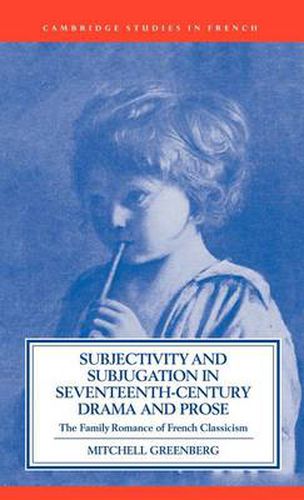Readings Newsletter
Become a Readings Member to make your shopping experience even easier.
Sign in or sign up for free!
You’re not far away from qualifying for FREE standard shipping within Australia
You’ve qualified for FREE standard shipping within Australia
The cart is loading…






This book analyses the relation between an emergent modern subjectivity in seventeenth-century French literature, particularly in dramatic works, and the contemporaneous evolution of the absolutist state. It shows how major writers of the Classical period (Corneille, Racine, Moliere, Lafayette) elaborate a new subject in and through their representations of the family, and argues that the family serves as the mediating locus of a patriarchal ideology of sexual and political containment. Most importantly, it asks why the theatre became the privileged form of representation in this state, and why this theatre concentrates almost exclusively on family conflict. Professor Greenberg argues that the narrative of oedipal sexuality and subjugation central to this new literary canon reflected the conflicting social, political and economic forces that were shifting European society away from the universe of the Renaissance and guiding it towards the ‘transparency’ of Classical representation.
$9.00 standard shipping within Australia
FREE standard shipping within Australia for orders over $100.00
Express & International shipping calculated at checkout
This book analyses the relation between an emergent modern subjectivity in seventeenth-century French literature, particularly in dramatic works, and the contemporaneous evolution of the absolutist state. It shows how major writers of the Classical period (Corneille, Racine, Moliere, Lafayette) elaborate a new subject in and through their representations of the family, and argues that the family serves as the mediating locus of a patriarchal ideology of sexual and political containment. Most importantly, it asks why the theatre became the privileged form of representation in this state, and why this theatre concentrates almost exclusively on family conflict. Professor Greenberg argues that the narrative of oedipal sexuality and subjugation central to this new literary canon reflected the conflicting social, political and economic forces that were shifting European society away from the universe of the Renaissance and guiding it towards the ‘transparency’ of Classical representation.